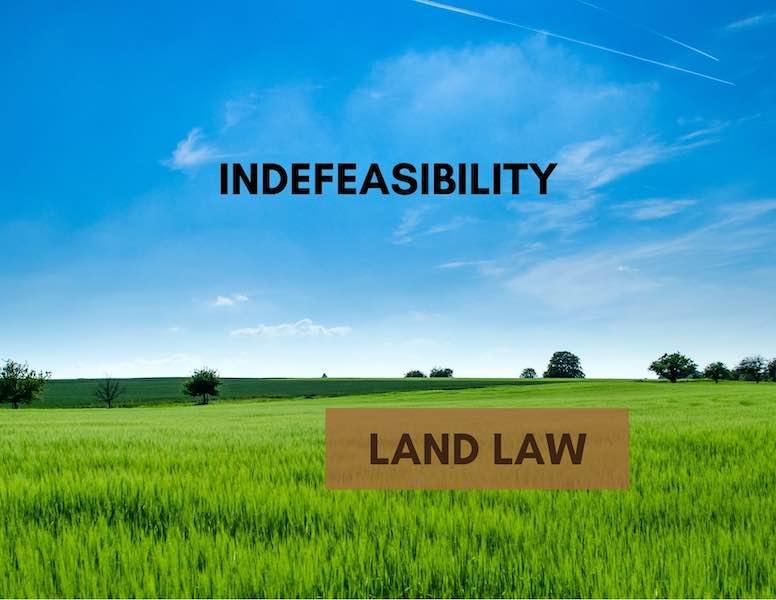Landowners Beware: A Tale of Indefeasibility
by Alliff Benjamin Suhaimi & Phoebe Loi Yean Wei ~ 29 October 2020

Contributed by:

Alliff Benjamin Suhaimi (Partner)
Tel: 603-6201 5678 / Fax: 603-6203 5678
Email: ben@thomasphilip.com.my
Website: www.thomasphilip.com.my
Phoebe Loi Yean Wei (Associate)
Email: pyw@thomasphilip.com.my
Website: www.thomasphilip.com.my
Introduction
Malaysia adopts the Torrens system of registration in relation to our land law. This means, a person’s interest and/or right over a piece of land must be registered in order for it to enjoy legal protection. This is particularly important for ownership of land as an owner’s title over a piece of land is indefeasible once it is registered subject to a few exceptions.
Whenever the issue of “Indefeasibility of Title” comes up, two Federal Court cases will surely come to mind:-
- Adorna Properties Sdn Bhd v Boonsom Boonyanit @ Sun Yok Eng [2001] 1 MLJ 241; and
- Tan Ying Hong v Tan Sian San & Ors [2010] 2 MLJ 1.
Adorna Properties and Tan Ying Hong are very much known and remembered by our land law stakeholders due to the contrasting positions taken in both cases towards the interpretation of Section 340 of the National Land Code 1965 (“NLC”) – the provision dealing with the indefeasibility of a title or interest.
The meaning of indefeasible was defined by the Privy Council in Frazer v Walker & Ors [1967] 1 AC 569 to be “immunity from attack by the adverse claim to the land or interest in respect of which he is registered, which a registered proprietor enjoys.”
On one hand, the Federal Court in Adorna Properties held that Section 340 NLC conferred immediate indefeasibility. This became the subject of many criticisms as it had caused some injustices to landowners who were defrauded of their lands. On the other hand, Tan Ying Hong was a decision that was welcomed by many as the Federal Court overruled Adorna Properties and held that Section 340 NLC confers deferred indefeasibility.
Immediate Indefeasibility v Deferred Indefeasibility
It is important to recognise the difference between immediate indefeasibility and deferred indefeasibility:
1. Immediate Indefeasibility: immediate indefeasibility means that an immediate purchaser of title/interest will have indefeasible title notwithstanding that the title/interest was obtained pursuant to vitiating circumstances (see Section 340(2) NLC)
2. Deferred Indefeasibility: subsequent purchasers of land acquired by means of fraud and/or forgery, were they found to be acting in good faith and have purchased the land for valuable consideration, would be afforded an indefeasible title to the land
Section 340 of the National Land Code 1965
Section 340 (1), (2) and (3) of the NLC reads as follows:-
1. The title or interest of any person or body for the time being registered as proprietor of any land, or in whose name any lease, charge or easement is for the time being registered, shall, subject to the following provisions of this section, be indefeasible.
2. The title or interest of any such person or body shall not be indefeasible-
a. in any case of fraud or misrepresentation to which the person or body, or any agent of the person or body, was a party or privy; or
b. where registration was obtained by forgery, or by means of an insufficient or void instrument; or
c. where the title or interest was unlawfully acquired by the person or body in the purported exercise of any power or authority conferred by any written law.
3. Where the title or interest of any person or body is defeasible by reason of any of the circumstances specified in sub-section (2)-
a. it shall be liable to be set aside in the hands of any person or body to whom it may subsequently be transferred; and
b. any interest subsequently granted thereout shall be liable to be set aside in the hands of any person or body in whom it is for the time being vested:
Provided that nothing in this sub-section shall affect any title or interest acquired by any purchaser in good faith and for valuable consideration, or by any person or body claiming through or under such a purchaser.
We will now turn to look at how the courts have interpreted Section 340 of the NLC.
Adorna Properties
In the case of Adorna Properties, Madam Boonsom Boonyanit (Respondent) was the registered proprietor of a piece of land which had been sold and transferred to Adorna Properties (Appellant). Madam Boonyanit claimed that her signature was forged by the vendor who sold and transferred her land to Adorna Properties. A claim was filed in the High Court for Madam Boonyanit to be restored as the registered owner of the land. The High Court dismissed the claim, whereas the Court of Appeal reversed the High Court’s decision and restored to Madam Boonyanit her rights in the land.
However, the story did not end there. Adorna Properties appealed to the Federal Court, where the Court of Appeal’s decision was reversed in favour of Adorna Properties. In its often-criticised ruling, the Federal Court unanimously held that the proviso in Section 340 (3) of the NLC excludes all purchasers in good faith and for valuable consideration from the substantive provision of Section 340(3)(a) and (b) NLC.
In other words, Adorna Properties’ title over the land enjoys immediate indefeasibility as it had purchased Madam Boonyanit’s land in good faith and for valuable consideration. This is despite the fact that her signature on the instrument of transfer had been forged by the vendor. Now you can see why this decision has been unpopular to say the least.
Tan Ying Hong
Nearly a decade after the controversial decision above, the Federal Court was given an opportunity to review its decision in Adorna Properties, via the case of Tan Ying Hong.
Mr Tan (Appellant) was the registered owner of a piece of land in Kuantan. The 1st Respondent, who was purporting to act under a power of attorney granted by Mr Tan, executed charges in favour of the 3rd Respondent, United Malayan Banking Corp (“Bank”). The purpose of these charges was to secure loans amounting to RM300,000 for the 2nd Respondent, Cini Timber Industries Sdn Bhd. Mr Tan was not aware of the existence of such charges until the Bank issued a notice of demand to him. Mr Tan claimed that his signature was forged and that he had not signed the power of attorney and as such, the charge instruments executed in favour of the Bank was void.
The High Court found that Mr Tan had never granted the power of attorney to the 1st Respondent and therefore, the 1st Respondent had no authority to charge the land to the Bank. As such, the registration of Mr Tan in the issue document of title was found to be obtained by fraud or forgery. Despite making such findings, the High Court was bound by the decision of the Federal Court in Adorna Properties and the Bank was held to have obtained an indefeasible title to the land. Mr Tan appealed to the Federal Court and the question that came before the Court was:
Whether Section 340 NLC confers upon the registered proprietor or any person having registered interest in the land an immediate or deferred indefeasibility?
In answering the above question, it was held that Adorna Properties had been incorrectly decided. The proviso immediately after Section 340(3) of the NLC is directed towards s 340(3) alone and not to the earlier subsection. Although Section 340(3)(a) and (b) referred to the circumstances specified in Section 340(2), the application of the proviso was restricted to subsequent purchasers of the land.
As such, a party who finds itself in the same position as Adorna Properties (an immediate purchaser to the vitiating circumstances in Section 340(2)) could not rely on the proviso in Section 340(3) to claim that his title is indefeasible and avoid its title or interest from being impeached. Only subsequent purchasers of the land can rely on the proviso in Section 340(3).
In Tan Ying Hong, it was not in dispute that the charges executed in favour of the Bank by the 1st Respondent was based on void instruments. The Bank, being the immediate holder of the charges (and not a subsequent purchaser or holder of interest), could not rely on the proviso to Section 340(3).
The fact that the Bank had acquired the interest in good faith for value was not in issue because the charges arose from void instruments. It automatically followed that such charges were liable to be set aside and Mr Tan’s appeal was allowed.
Needless to say, the decision in Tan Ying Hong brings a breath of relief to landowners as the risk of losing their lands over the vitiating circumstances stated in Section 340(2) NLC has been lowered.
However, it must be borne in mind that landowners are unlikely to recover their lands from subsequent purchasers if it can be shown that the land has been purchased in good faith and for valuable consideration.
Meaning of “Good Faith”
What then is the meaning of good faith? The answer to this can be found in yet another one of the Federal Court’s decision in T Sivam a/l Tharamalingam v Public Bank Bhd [2018] 5 MLJ 711.
In T Sivam, the Court held that the existence of good faith or otherwise would depend on the particular facts of each case; it is a question of fact in each case for the court to determine on the evidence. The overriding consideration is ‘the particular circumstances of each case. Having referred to two previous Federal Court and Court of Appeal decisions, the Federal Court held as follows:-
- Good faith does not mean absence of fraud, deceit or dishonesty. It also requires acting honestly, reasonably or fairly;
- It is not enough for a purchaser to merely show absence of fraud, deceit or dishonesty; knowledge of a dispute as to the ownership of property and knowledge of fraud allegation, for example, could vitiate good faith;
- A purchaser in good faith did not include a purchaser who was careless or who had been negligent; and
- The elements of good faith are not closed. It must in all cases depend upon the circumstances.
Meaning of “Valuable Consideration”
As to the meaning of “valuable consideration”, the Court of Appeal in Ahmad Md Daud & Anor v Che Yah Man [2009] 6 CLJ 530 referred to the House of Lords decision in Midland Bank Trust Co Ltd v. Green [1981] AC 513 and adopted the following definition:
“Valuable consideration' requires no definition: it is an expression denoting an advantage conferred or detriment suffered.”
Conclusion
The Federal Court’s decision in Tan Ying Hong, although unable to undo the damage done by Adorna Properties, has restored the protection accorded to landowners who find themselves at risk of losing their lands due to the vitiating circumstances.
This is the case where the rights to the land are still in the hands of an immediate purchaser. One may not be faulted for thinking that the protection is not enough, as subsequent purchasers can still rely on the proviso in Section 340 (3) to prevent their rights to the land from being impeached. Regardless, it must not be forgotten that for a subsequent purchaser to rely on the proviso, the purchaser must first prove to the court that the title or interest to the land has been acquired in good faith for valuable consideration.
In a time where the world economy is badly affected by the Covid-19 pandemic, there will be an increase in the number of land dealings as people are trying to make ends meet and liquidate their assets. For this reason, the public must exercise great care and perform the necessary checks before deciding to purchase any land regardless of how much of a bargain it might be.